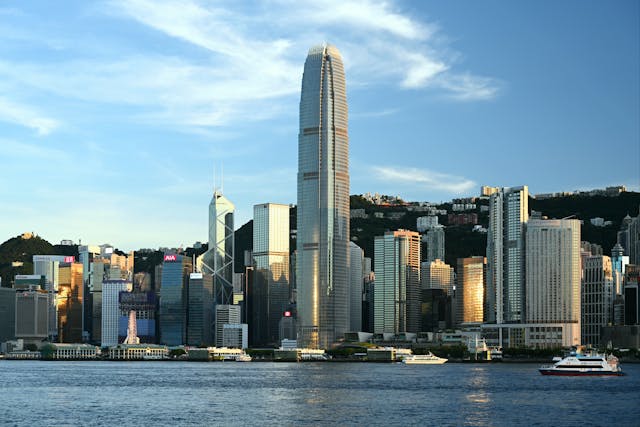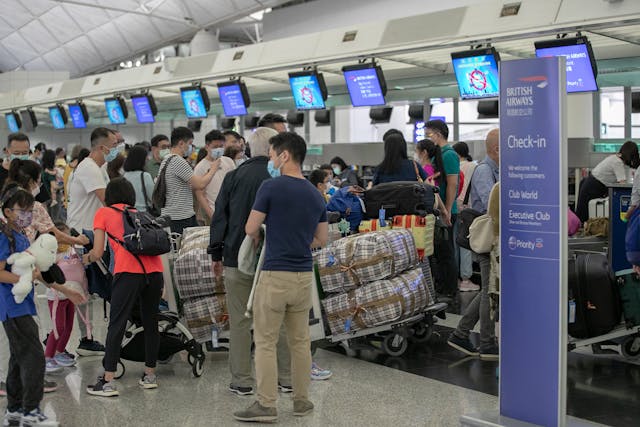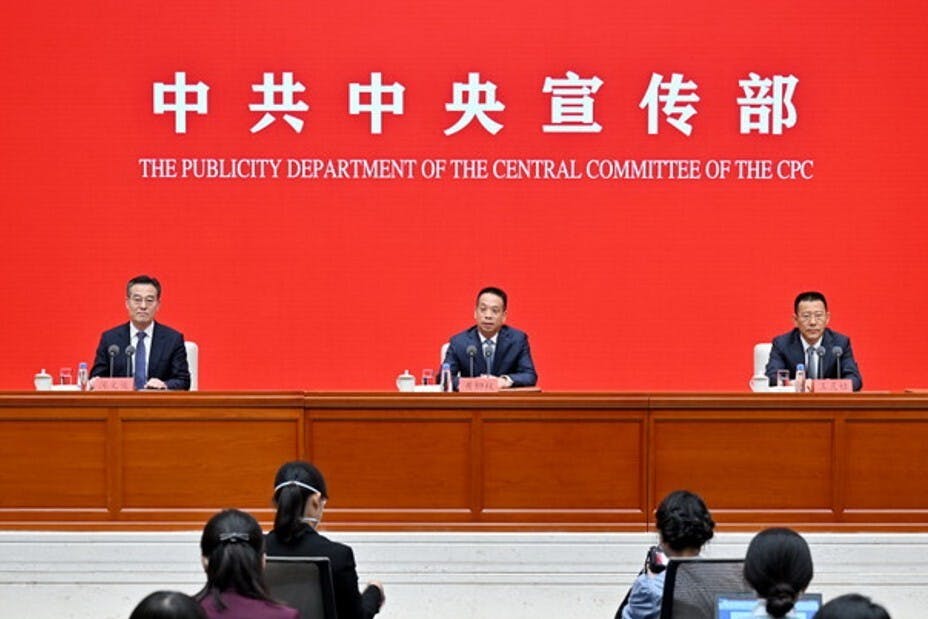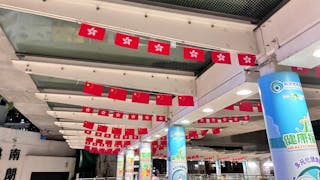從9月21日中共中央宣傳部新聞發布會上,負責港澳台事務的幾位內地官員的公開表態來看,香港和台灣一國兩制的詳細官方路線已經已經劃定了。
國務院港澳事務辦公室副主任黃柳權和王靈桂在北京舉行記者會,就港澳實施一國兩制,王靈桂提出了值得我們關注的7個要點。
保持經濟自由開放 加快融入祖國發展
一是在習近平總書記的領導下,一國兩制的理論開啟了新的篇章和新局面,並為新時代一國兩制的發展奠定了基礎。
二是完善一國兩制制度,特別是在香港「局勢一度出現嚴峻局面」之後,「黨中央果斷決策,完善了香港選舉制度」,在香港的「政權掌握在愛國者手中」的基礎上,又支持澳門修改《澳門國安法》。
第三,香港和澳門要在中央政府的全力支持下保持繁榮穩定。香港的國際金融、航運和貿易中心可以隨着創新和科技的迅速崛起而鞏固,同時保持其經濟自由和開放和「一流」的營商環境,並保持其普通法制度的發展。
第四,港澳要加快融入國家發展進程。在這方面,根據王靈桂的說法,習總書記親自推動粵港澳大灣區建設發展,包括廣深港高鐵、港澳珠大橋等基礎設施項目的開通,以及其他主要沿海和邊境地區,如橫琴、前海、南沙合作區的發展,以便港澳居民跨境流動。
第五,以《基本法》為基礎,進一步鞏固港澳憲制秩序,不斷完善治理體系。王靈桂指出,中央對兩個特別行政區實行「綜合管轄」,制定實施《香港國安法》,啟動修改《澳門國安法》進程。在這種情況下,「愛國者」管治着香港和澳門,兩地的民主發展仍在繼續,居民享有全面的權利和自由。
第六,香港和澳門在許多挑戰中取得了勝利,包括新冠病毒和社會動盪都無法阻止兩地進步,兩地的教育、科技、醫療、文化和體育水平都得到了提高。
第七,港澳與祖國優勢互補,共同發展,加快融入中華民族復興的「偉大征程」。澳門在建設中國與葡語國家經貿關係的平台方面發揮着重要作用,而香港和澳門正在發揮開放、「與國際規則接軌」、為國家「深化改革開放」向外界敞開大門發揮作用。

檢疫政策窒礙港澳發展
客觀地說,前6點確實在港澳兩地都做到了。但是,在過去的一個月裏,港澳特別是澳門放寬入境的速度非常緩慢,尤其當世界上許多國家設想新冠病毒及其變異病毒株比以往任何時候都弱得多之際。
9月23日,香港公布了 「0+3」的檢疫安排,讓更多的外地遊客可以在更大範圍內更自由地遊覽這座城市,並且不受嚴格的檢疫限制。然而,澳門繼續就檢疫措施向國家徵求意見和批准,對來自中國內地以外地區(包括香港)的入境旅客繼續實施「7+3」檢疫要求。
從客觀和批判性的角度來看,港澳兩個特別行政區因為嚴格的檢疫政策受到阻礙,尤其是澳門,自2020年初以來,澳門的防疫政策一直唯內地馬首是瞻。最終,如果香港和澳門真的能成為中國「深化改革開放」的門戶,內地必須以更加全球化和更大膽的方式重新審視其動態清零的防疫政策。
中宣部記者會上,黃柳權發表了無法真正說服部分港人的言論──否認香港出現移民潮,認為說法「並不是很恰當」。對於香港的普通市民來說,他們的許多親友在近年,尤其是在2020年初之後,已經因為種種原因離開了香港。社會上一些領域,如資訊科技和教育,確實遭受了人才流失的困擾。
黃柳權用香港政府統計數據來反駁移民潮的說法,從非常客觀的角度來看,並不能說服許多感受到這種移民趨勢的香港人。不少私人樓宇單位在放售,可見大量市民遷移出香港的程度。甚至一些外籍人士也已經離開香港,主要是因為嚴格的防疫政策。

中央對台政策或有細微調整
9月21日,另外兩次重要的記者會由中央台辦宣傳局局長馬曉光和中央台辦新聞發言人朱鳳蓮等與會,也值得我們關注。
馬曉光表示,一國兩制仍然是「包容」、「和平」、「民主」、「雙贏」的「善意」的方案,以解決兩種不同社會制度和不同意識形態的問題。具體而言,「和平統一、一國兩制」仍然是解決台灣問題的基本方針,體現了海納百川、有容乃大的中華智慧。
馬曉光稱,兩岸統一後台灣可以實行不同於祖國大陸的社會制度,台灣同胞可以在和平安寧狀態下生活工作;台灣同胞的私人財產、宗教信仰及合法權益將得到充分保障。經濟上,兩岸統一後,台灣可以加強與大陸的經濟合作,發展空間更大、產業鏈供應鏈更加暢通、文化創造力得到充分發揚、財政收入盡可用於改善民生等。
馬曉光正面評價一國兩制對台灣的好處的同時,朱鳳蓮卻重申,大陸方面將繼續對台獨分子採取一系列反制行動。她補充說,有可能對這些台獨分子採取「進一步的法治新舉措」,以維護國家主權安全發展利益。她的言論暗示,在10月中旬的中共二十大上,可能會制定新的政策和法律,以未來幾年針對台獨勢力。
從馬曉光的溫和言論和朱鳳蓮的強硬姿態來看,中央對台政策既有延續性又有細微調整。
包容是成功的先決條件
總而言之,一國兩制仍然是中央對港澳、台灣政策的基本方針。不可否認,近年來,北京一直在努力完善和完善港澳一國兩制的內容,《國安法》無疑對香港有穩定的影響,而澳門的經濟多元化進程在其博彩業的延續中得到鼓勵。
然而,不可否認的事實是,香港和澳門一直因新冠病毒及其變異病毒株的持續存在而蒙受經濟損失。因此,雖然香港的大門現在逐漸向外界敞開,但中央當局必須考慮並採取更大膽的做法,以實施其對香港和澳門乃至外界的動態清零政策。歸根究柢,如果一國兩制模式的設計和實施不僅有利於港澳台,也有利於不同社會經濟和政治制度的人民和平共處,那麼它的進一步完善,更包容和更大膽的實施,或許是未來幾年,一國兩制在港澳台地區取得成功的先決條件。
Understanding the Official Perspective on “One Country, Two Systems”
Judging from the public remarks made by several mainland Chinese officials, who are from the Central Publicity Department and responsible for Hong Kong and Taiwan affairs on September 21, a detailed official line on the “one country, two systems” of Hong Kong and Taiwan has already been delineated.
On the implementation of the “one country, two systems” in Hong Kong and Macau, the deputy directors of the State Council’s Hong Kong Macau Affairs Office, Huang Liuquan and Wang Linggui, held a press briefing in Beijing. Wang made seven main points that deserve our attention.
First, the theory of “one country, two systems” has opened a new chapter and situation under the leadership of the General Secretary of the Communist Party of China (CPC), Xi Jinping, whose remarks according to Wang have laid the foundation of the development of “one country, two systems” in a new era.
Second, the system of “one country, two systems” is going to be improved and perfected, especially after the “serious circumstances” of Hong Kong and after the response of the CPC to centralize leadership, to construct its “comprehensive jurisdiction” over Hong Kong and to support Macau in the process of revising the Macau national security law.
Third, Hong Kong and Macau must maintain their prosperity and stability under the full support of the central government. Hong Kong’s international finance, shipping and trade center can be consolidated with the rapid rise of innovation and technology, while maintaining its economic freedom and openness and “first-class” business environment as well as retaining the development of its common law system.
Fourth, Hong Kong and Macau must be integrated more rapidly into China’s national development. In this aspect, General Secretary Xi, according to Wang, promotes in person the construction and development of the Greater Bay Area for Guangdong, Hong Kong and Macau, including the opening of infrastructure projects such as the Guangzhou-Shenzhen-Hong Kong Express Rail Link, the Hong Kong-Macau-Zhuhai Bridge, and other major coastal and border areas such as cooperative platforms of Hengqin, Qianhai, Nansha that facilitate the cross-border movement of residents from Hong Kong and Macau.
Fifth, the constitutional order of Hong Kong and Macau is consolidated further by having their Basic Law as the foundation, while the process of improving their governance system persists. Wang pointed out that the central government implements its “comprehensive jurisdiction” over the two special administrative regions, formulating and implementing the national security law for Hong Kong and initiating the process of amending the national security law for Macau. Under these circumstances, “patriots” are ruling Hong Kong and Macau while democratic development in both places continues as their residents enjoy comprehensive rights and freedom.
Sixth, Hong Kong and Macau score victories over many challenges, including Covid-19 and social turbulences that could not stop the progress of the two places, where the standards of education, technology, health care, culture and sports are all elevated.
Seventh, Hong Kong and Macau supplement the strengths of their mainland motherland and foster mutual development while speeding up the process of integrating into the “great journey” of Chinese renaissance. While Macau plays a crucial role in establishing a platform for China to enhance trade relations with the Portuguese-speaking countries, Hong Kong and Macau are developing their comparative advantages of openness, “merging with the international rules and regulations,” and functioning as “deepened open doors” to the outside world for mainland China.
Objectively speaking, the first six points have indeed been achieved in both Hong Kong and Macau. But the openness of Hong Kong and Macau, especially Macau, have been hampered by a very slow process of opening their doors to outside tourists in the past month when many countries in the world have been opening their border by assuming that Covid-19 and its variants are much weaker than ever before.
On September 23, Hong Kong announced the formula of 0+3 so that more outside tourists can now visit the city in a larger scale with much freedom and without tight quarantine restrictions.
However, Macau continues to look to the motherland for advice and approval on the quarantine measures, implementing 7+3 quarantine requirement for inbound travellers from locations outside of mainland China.
The two special administrative regions, from an objective and a critical perspective, have been hampered by a tight quarantine policy, especially Macau which has since early 2020 been looking to the mainland for yardstick, advice and approval in its anti-Covid-19 policies.
Ultimately, their mainland motherland has to revisit its dynamic zero Covid-19 policy in a more globalized and bolder manner if Hong Kong and Macau can really function as the “deepening open doors” for China.
In the press conference, Huang Liuquan made a remark that could not really convince some Hong Kong people: his denial that it is “not appropriate” to talk about the “emigration trend” in Hong Kong. For the ordinary citizens of Hong Kong, many of their friends and relatives have already left the Hong Kong Special Administrative Region (HKSAR) in the recent years, especially after early 2020 for a variety of reasons. Some social sectors, like information technology and education, have really been suffering from brain drain. Wang’s usage of Hong Kong’s official statistics to refute the trend of emigration could not, from a very objective perspective, convince many Hong Kong people who have felt the thrust of such emigration. Many apartment units in the private sector are on sale, indicating the degree of mass emigration out of Hong Kong. Even some expatriates have already left Hong Kong mainly because of the strict anti-Covid-19 policy.
Two other important press briefings given by Ma Xiaoguang, a spokesperson of the central government’s Taiwan Affairs Office, and by Zhu Fenglian, another spokesperson of the same office, on September 21, deserve our attention.
Ma remarked that the “one country, two systems” remains a “tolerant,” “peaceful,” “democratic” and a “win-win” model with “goodwill” to solve the issue of having two different social systems and different ideologies. Specifically, “peaceful reunification and one country, two systems,” according to Ma, remain the basic principles for mainland China to solve the Taiwan question, because the model involves Chinese wisdom and constructive solutions. Ma said that, after reunification, Taiwan would be able to enjoy a social system different from the mainland, and that the Taiwan comrades would be able to live and work in Taiwan with peace and calmness. Taiwan comrades would also be able to have their private property protected, apart from the protection of their religious freedom and legitimate rights. Economically, after reunification, Taiwan would be able to enhance economic cooperation with the mainland and its own economic development would have more space, including the smoothness of logistical supply chains, innovative vitality, financial revenue and livelihood improvement.
Ma’s positive remarks on the benefits of “one country, two systems” to Taiwan were accompanied by Zhu’s warning that the mainland would continue to adopt countermeasures against those Taiwan separatists. Zhu added that there might be a possibility of “further new rule of law measures” against these Taiwan people so that China’s national sovereignty, security and developmental interest would be protected. Her remarks implied that during the Party Congress in mid-October, a new policy and law would perhaps be produced to target at the Taiwan separatists in the coming years.
Judging from Ma’s softline remarks and Zhu’s more hardline gesture, the central government has continuities and slight adjustment in its policy toward Taiwan.
In conclusion, “one country, two systems” remains as the mainstay of the central government’s policy toward not only Hong Kong and Macau but also Taiwan. It is an undeniable fact that Beijing has been working hard to improve and perfect the content of “one country, two systems” for Hong Kong and Macau in the recent years. The national security law has undoubtedly a stabilizing impact on Hong Kong, while Macau’s suitable process of economic diversification is encouraged amid its continuation of the casino industry. Nevertheless, it is also an undeniable fact that Hong Kong and Macau have been suffering economically from the persistence of Covid-19 and its variants. As such, although the door of Hong Kong is now gradually opened to the outside world, the central authorities must consider and adopt a much bolder approach in its dynamic zero Covid-19 policy toward not only Hong Kong and Macau but also the outside world. Ultimately, if the “one country, two systems” model is designed and implemented for the benefit of not only Hong Kong, Macau and Taiwan but also the peaceful coexistence of peoples in different socio-economic and political systems, then its further improvement, more tolerant and much bolder implementation will perhaps be a prerequisite for the success of the model to Hong Kong, Macau and Taiwan in the coming years.





































